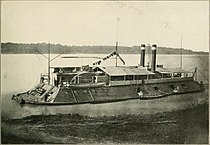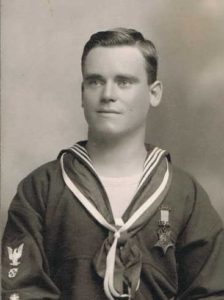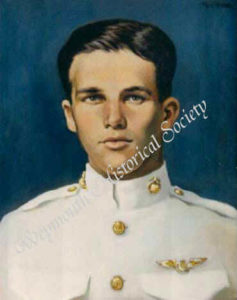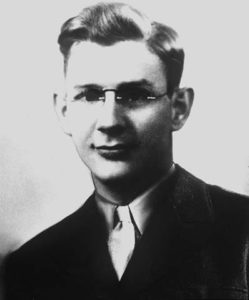Medal of Honor Recipients
Weymouth is proud to be home to five recipients of the Congressional Medal of Honor. It is the only town in the United States to hold that distinction. The Congressional Medal of Honor is the highest military decoration awarded to recognize U.S. military service members who have distinguished themselves by acts of valor.

Thomas W. HAMILTON
Rank and Organization: Quartermaster, U.S. Navy
Born: 1833, Scotland
Accredited To: Massachusetts
G.O. No.: 17, 10 July 1863
Citation: Serving as quartermaster on board the U.S.S. Cincinnati during the attack on the Vicksburg batteries and at the time of her sinking, 27 May 1863. Engaging the enemy in a fierce battle, the Cincinnati, amidst an incessant fire of shot and shell, continued to fire her guns to the last although so penetrated by enemy shellfire that her fate was sealed. Conspicuously gallant during this action, Hamilton, severely wounded at the wheel, returned to his post and had to be sent below, to hear the incessant roar of guns as the gallant ship went down, "her colors nailed to the mast."

William SEACH
Rank and Organization: Ordinary Seaman, U.S. Navy
Place and Date: China 13, 20, 21, and 22 June 1900
Entered Service at: Massachusetts
Born: 23 May 1877, London, England
G. O. No.: 55, 19 July 1901
Citation: In action with the relief expedition of the Allied forces in China during the battles of 13, 20, 21 and 22 June 1900. June 13: Seach and 6 others were cited for their courage in repulsing an attack by 300 Chinese Imperialist soldiers and Boxer militants with a bayonet charge, thus thwarting a planned massive attack on the entire force. June 20: During a day-long battle, Seach ran across an open clearing, gained cover, and cleaned out nests of Chinese snipers. June 21: During a surprise saber attack by Chinese cavalrymen, Seach was cited for defending gun emplacements. June 22: Seach and others breached the wall of a Chinese fort, fought their way to the enemy's guns, and turned the cannon upon the defenders of the fort. Throughout this period and in the presence of the enemy, Seach distinguished himself by meritorious conduct.

Ralph TALBOT
Rank and Organization: Second Lieutenant, U.S. Marine Corps
Born: 6 January 1897, South Weymouth, Mass.
Appointed from: Connecticut
Citation: For exceptionally meritorious service and extraordinary heroism while attached to Squadron C, 1st Marine Aviation Force, in France. 2d Lt. Talbot participated in numerous air raids into enemy territory. On 8 October 1918, while on such a raid, he was attacked by 9 enemy scouts, and in the fight that followed shot down an enemy plane. Also, on 14 October 1918, while on a raid over Pittham, Belgium, 2d Lt. Talbot and another plane became detached from the formation on account of motor trouble and were attacked by 12 enemy scouts. During the severe fight that followed, his plane shot down 1 of the enemy scouts. His observer was shot through the elbow and his gun jammed. 2d Lt. Talbot maneuvered to gain time for his observer to clear the jam with one hand, and then returned to the fight. The observer fought until shot twice, once in the stomach and once in the hip and then collapsed, 2d Lt. Talbot attacked the nearest enemy scout with his front guns and shot him down. With his observer unconscious and his motor failing, he dived to escape the balance of the enemy and crossed the German trenches at an altitude of 50 feet, landing at the nearest hospital to leave his observer, and then returning to his aerodrome.
Note: Lieutenant Talbot is buried at Mount Wollaston Cemetery in Quincy.

Elden H. JOHNSON
Rank and Organization: Private, U.S. Army, 15th Infantry, 3d Infantry Division
Place and date: Near Valmontone, Italy, 3 June 1944
Entered service at: East Weymouth, Mass.
Birth: Bivalve, N.J.
G.O. No: 38, 16 May 1945
Citation: For conspicuous gallantry and intrepidity at risk of life above and beyond the call of duty. Pvt. Johnson elected to sacrifice his life in order that his comrades might extricate themselves from an ambush. Braving the massed fire of about 60 riflemen, 3 machineguns, and 3 tanks from positions only 25 yards distant, he stood erect and signaled his patrol leader to withdraw. The whole area was brightly illuminated by enemy flares. Then, despite 20mm. machineguns, machine pistol, and rifle fire directed at him, Pvt. Johnson advanced beyond the enemy in a slow deliberate walk. Firing his automatic rifle from the hip, he succeeded in distracting the enemy and enabled his 12 comrades to escape. Advancing to within 5 yards of a machinegun, emptying his weapon, Pvt. Johnson killed its crew. Standing in full view of the enemy he reloaded and turned on the riflemen to the left, firing directly into their positions. He either killed or wounded 4 of them. A burst of machinegun fire tore into Pvt. Johnson and he dropped to his knees. Fighting to the very last, he steadied himself on his knees and sent a final burst of fire crashing into another German. With that he slumped forward dead. Pvt. Johnson had willingly given his life in order that his comrades might live. These acts on the part of Pvt. Johnson were an inspiration to the entire command and are in keeping with the highest traditions of the armed forces.

Frederick C. MURPHY
Rank and Organization: Private First Class, U.S. Army, Medical Detachment, 259th Infantry, 65th Infantry Division
Place and Date: Siegfried Line at Saarlautern, Germany, 18 March 1945
Entered Service at: Weymouth, Mass.
Birth: Boston, Mass.
G.O. No.: 21, 26 February 1946
Citation: An aid man, he was wounded in the right shoulder soon after his comrades had jumped off in a dawn attack 18 March 1945, against the Siegfried Line at Saarlautern, Germany. He refused to withdraw for treatment and continued forward, administering first aid under heavy machinegun, mortar, and artillery fire. When the company ran into a thickly sown antipersonnel minefield and began to suffer more and more casualties, he continued to disregard his own wound and unhesitatingly braved the danger of exploding mines, moving about through heavy fire and helping the injured until he stepped on a mine which severed one of his feet. In spite of his grievous wounds, he struggled on with his work, refusing to be evacuated and crawling from man to man administering to them while in great pain and bleeding profusely. He was killed by the blast of another mine which he had dragged himself across in an effort to reach still another casualty. With indomitable courage, and unquenchable spirit of self-sacrifice and supreme devotion to duty, which made it possible for him to continue performing his tasks while barely able to move, Pfc. Murphy saved many of his fellow soldiers at the cost of his own life.